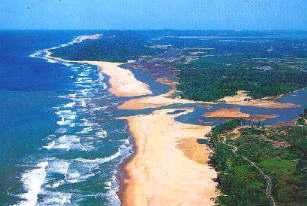Hydrobiology
Hydrobiology is the science of life and life processes in water. Much of modern hydrobiology can be viewed as a sub-discipline of ecology but the sphere of hydrobiology includes taxonomy, economic biology, industrial biology, morphology, physiology etc. The one distinguishing aspect is that all relate to aquatic organisms. Much work is closely related to limnology and can be divided into lotic system ecology (flowing waters) and lentic system ecology (still waters).
One of the significant areas of current research is eutrophication. Special attention is paid to biotic interactions in plankton assemblage including the microbial loop, the mechanism of influencing water blooms, phosphorus load and lake turnover. Another subject of research is the acidification of mountain lakes. Long-term studies are carried out on changes in the ionic composition of the water of rivers, lakes and reservoirs in connection with acid rain and fertilisation. One goal of current research is elucidation of the basic environmental functions of the ecosystem in reservoirs, which are important for water quality management and water supply.
Much of the early work of hydrobiologists concentrated on the biological processes utilised in sewage treatment and water purification especially slow sand filters. Other historically important work sought to provide biotic indices for classifying waters according to the biotic communities that they supported. This work continues to this day in Europe in the development of classification tools for assessing water bodies for the EU water framework directive.
Field of research interests
The following are the research interests of hydrobiologists:
- acidification impact on lake and reservoir ecosystems
- ocean acidification
- paleolimnology of remote mountain lakes
- molecular ecology, phylogeography and taxonomy of Cladocera
- ultramorphology of cladoceran limbs and feeding adaptations
- chemical communication in plankton (prey-predator interaction)
- biomanipulation of water reservoirs
- cyclus of major nutrients (phosphorus, nitrogen)
- self-controlling mechanisms at population and community level
Organizations
- American Society of Limnology and Oceanography (ASLO)
- International Association of Theoretical and Applied Limnology (SIL)
- American Fisheries Society
- Freshwater Biological Association, England
- Marine Biological Laboratory (USA)
- Australian Society for Fish Biology
- Fisheries and Marine Institute of Memorial University of Newfoundland
- Department of Hydrobiology (Charles University, Prague)
- Dresden University of Technology Institute of Hydrobiology
- Institute of Hydrobiology and Fishery Science
- Water Research Institute T.G.M.
- Hydrobiological Institute, Academy of Science of Czech Republic
- Research Institute of Fish Culture and Hydrobiology
- Department of Hydrobiology, Slovak Academy of Science, Bratislava, Slovakia
- Max-Planck-Institut fur Limnologie in Ploen, Germany
- CNR-Istituto Italiano di Idrobiologia
- Institute of Hydrobiology, Chinese Academy of Sciences
- Hydrobiology Pty Ltd Brisbane, Australia based private consulting company
- Institute of Zoology and Hydrobiology University of Tartu, Estonia
- Department of Hydrobiology Bulgarian Academy of Sciences
- Department of General and Applied Hydrobiology Faculty of Biology, Sofia University "Sveti Kliment Ohridski", Bulgaria
Journals
Notable researchers
See also
References
- E.P.H. Best (Editor), Jan P. Bakker (Editor) Netherlands-Wetlands (Developments in Hydrobiology series) (Kluwer Academic Publishers, Dordrecht, 1993, 328 pp) ISBN 0-7923-2473-0
- R.I. Jones (Editor), V. Ilmavirta (Editor) Flagellates in Freshwater Ecosystems (Developments in Hydrobiology series) (Kluwer Academic Publishers, Dordrecht, 1992, 498pp.) ISBN 90-6193-651-9
- Jürgen Schwoerbel Methods of hydrobiology (freshwater biology) (Pergamon Press; [1st English ed.] edition, 1970, 200pp.) ISBN 0-08-006604-6
External links
- Hydrobiology website Website for Hydrobiology, Aquacultures, Ichthyology, Water purification and Biological Oceanology - Bulgaria.
- The International Congress on the Biology of Fish
- Annual Larval Fish Conference
- Annual Northeast Fish and Wildlife Conference
- The Waterrose Aquatic Ecology Page
- Developments in Hydrobiology-Springer Book Series Prints proceedings for international conferences on Hydrobiology
| |||||||||||||||||||||||||

